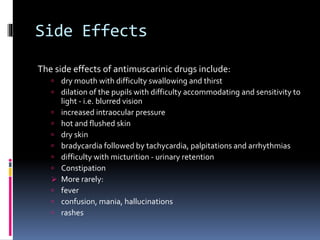Antimuscarinic Adverse Effects Include Which of the Following
Noted local antimuscarinic effects following topical ocular administration of 110 mgml of desloratadine. Side effects that occur occasionally include confusion.
Dry mouth xerostomia blurred vision photophobia tachycardia difficulty in urination hyperthermia glaucoma and mental confusion in the elderly and the mechanisms responsible for the classic symptoms of overdose.

. However they can also result in various adverse effects such as a sore throat tachycardia urinary retention obstipation vision changes and neurological changes. Medical Mnemonics Know the ABCDS of anticholinergic side effects. Most commonly anticholinergics can cause the following side effects.
These effects are sometimes called anticholinergic effects. Blind as a bat Mad as a hatter Red as a beet Dry as a bone Hot as hell Full as a flask. Antimuscarinic Drugs Anticholinergic 1.
Increased pupillary constrictor tone. In addition the liver and kidney have less ability to break down and excrete medications. Cholinergic blockers are contraindicated with antipsychotics.
Adverse reactions that require immediate action include. Dry mouth blurry vision constipation drowsiness sedation hallucinations memory problems trouble urinating confusion delirium decreased sweating decreased saliva. Antimuscarinic drugs are associated with the common anticholinergic adverse effects of dry mouth constipation blurred vision and somnolence.
Sore throat due to decreased mucus production. Side effects. Antimuscarinic adverse effects include which of the following.
Explain the acute side effects of antimuscarinics including. Anorexia Blurry vision Constipation Confusion Dry Mouth Sedation Stasis of urine. Reassess often for predictable adverse effects.
Drying of secretions lacrimal salivary respiratory GI sweat etc. Dry mouth due to the inhibition of the salivary glands. Fasciculations of voluntary muscles.
If your level of acetylcholine changes this can have effects all over your body. Antimuscarinic poisoning can result from overdose of antihistamines phenothiazines and tricyclic antidepressants. Antimuscarinic side effects.
Cholinergic blockers may decrease the sedative effects of hypnotics. Respiratory tract secretions. Although these are not life threatening they may be associated with poor compliance or persistence with treatment.
Since anticholinergic drugs arent specific to the types of receptor they block they can trigger a range of side effects impacting both the body and mind. Antimuscarinic effects are side effects caused by changes to the level of the chemical acetylcholine in your body. Side effects can include.
Also drugs can cross more easily into the brain. Ask about subtle manifestations of anticholinergic toxicity such as impaired cognition impaired visual accommodation slurred speech from a dry tongue and mouth reflux from delayed stomach emptying or frequent urination due to incomplete voiding. Additive antimuscarinic effects may occur with antihistamines.
Use low doses for the shortest possible time. Full activation of the parasympathetic nervous system is likely to produce which of the following effects. Dry mouth and sore throat.
Impaired secretion by exocrine glands. However it is unlikely that systemic concentrations of desloratadine would rise to levels approaching those in the present study following normal therapeutic dosages of desloratadine a fact which has been emphasized by others 37. The autonomic nervous system is also known as a Visceral b Vegetative c Involuntary nervous system d All of the above.
All of these factors contribute to greater anticholinergic side effects in older adults. Select all that apply Xerostomia Blurred vision Diarrhea Decrease in intraocular pressure Anhidrosis. Drugs with a narrow therapeutic range given orally may not stay in the GI tract long enough to produce an action.
Hyperthermia and warm dry skin. Accordingly antimuscarinic medications can be used to treat overactive bladder syndrome bradycardia Parkinsons Disease peptic ulcer and some respiratory conditions. Decreased intestinal motility c.
Differential diagnosis is important because antimuscarinic poisoning resembles which other condition. System Side effect Contraindications. Increased thermoregulatory sweating d.
Increased heart rate - Note that atropine but not the other agents may initially cause a slight transient bradycardia. The effects of botulinum toxin are likely to include a Bronchospasm b Cycloplegia c Diarrhea d Skeletal muscle spasms. Side effects of antimuscarinics include constipation transient bradycardia followed by tachycardia palpitations and arrhythmias reduced bronchial secretions urinary urgency and retention dilation of the pupils with loss of accommodation photophobia dry mouth flushing and dryness of the skin.
There is a narrow margin between first appearance of adverse reaction to AChE inhibitors and serious toxic effects.

Anticholinergic Antimuscarinic Adverse Drug Reactions To Amitriptyline Download Scientific Diagram

Antimuscarinics What Are They How Do They Work What Are They Used For Side Effects And More Osmosis


Comments
Post a Comment